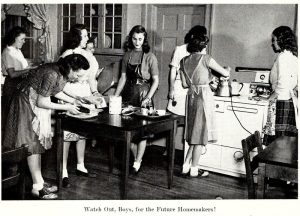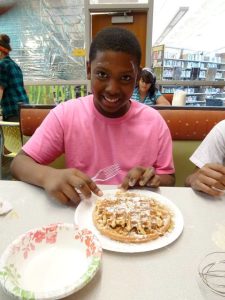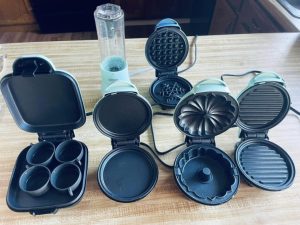
Home economics, once one of the main elective course options available to teenagers in the United States, has gone by the wayside in most junior and high schools, due to shifts in society such as
the women’s liberation movement and school districts’ desires to offer more academically-focused courses (Linkedin. com, 2023). Learning skills such as cooking, money management, and childcare have been replaced with college-readiness courses and classes focused on standardized tests. Relics of the past, such as electric stove tops and sewing machines, collect dust in closets and repurposed classrooms across the country.
“Many blame an ongoing shortage of qualified teachers, while others worry that continued focus on testing, along with budget slashing, will make it hard to bring family and consumer science electives back into the curriculum” reports Danovich in a 2018 article (npr.org).
Food is central to culture and quality of life and can provide not only nourishment, but balance. Applauding Michelle Obama’s campaign, “Let’s Move,” which updated school menus nationwide (much to my own children’s disappointment!), doctors Lichtenstein and Ludwig bemoan that nutrition education often ends at cafeteria doors (2010).
“Better choices in schools will ultimately have limited effects if children do not have the ability to make better choices in the outside-school world, where they spend the majority of their time when young and which they inhabit when older. If children are raised to feel uncomfortable in the kitchen, they will be at a disadvantage for life” (Lichtenstein & Ludwig, 2010, p.1).
There are, however, many examples of local branch library staff filling this information gap, particularly in cookery.
Andy Woodworth addressing cooking classes in a library setting writes, “Food represents so very much within our culture and social lives. It triggers treasured memories, extends hospitality, provides the shared experience of first dates, serves as a pretext for family and friends’ gatherings, and is praised both as a virtue and a vice for how it makes us look and feel” (2014). Woodworth goes on to suggest practical tips for beginning a library cooking program, such as logistical challenges and ways to avoid calls to the fire department.

The School Library Journal offers a blog entry on their “Teen Library Toolbox” website for “For teen librarians short on time, short on money, but not, short on passion” (2023). Karen Jensen, a teen services librarian, gushes in her post about the many wonders of small electric cooking gadgets when cooking with teens in the library. Mini-waffle makers, griddles, blenders, and lots of patience are her tools for culinary success with young people.

Jensen creates lessons that are fun and easy and incorporate what kids are familiar with, such as quick TikTok recipes and the show Cupcake Wars. Who knew you could make eggs, garlic bread, and chicken parmesan with a miniature waffle maker?
Library assistant, Stacey Desrosiers of the Goffstown Public Library in New Hampshire, began her engaging cooking and life-skills program for teenagers during COVID lockdown, and continues the program today. Cooking tutorials are the most popular, however, Desrosiers’ GPL YouTube channel also offers segments on grocery shopping, laundry, and finances–all the good stuff those of us over 45 were once taught between math and history classes.
Programs such as these are examples of “learning by doing” as suggested in Michael Stephen’s Heart of Librarianship (2016). Cooking with teenagers will undoubtedly require fortitude and plenty of rags for cleaning up. “Real-messiness offers a level of experience unmatched by classroom activities” writes Stephens (2016, p. 124). While this sentiment was in reference to LIS courses for adults, it seems almost more literal and applicable in this instance. “Learning by play, exploration, and creation,” (Stephens, 2016, p. 124) is embodied in these programs hosted by fearless librarian staff members spending time with hormonal teens, raw eggs, and powdery flour, which seems to find its way into each surrounding crevice and surface.
These librarians, and many more like them, truly fill an information gap, and do so by following the aforementioned mantra of “learning by doing.” They pick up their whisks, aprons, and I guess, waffle makers, and make a delicious difference in teenagers’ lives.
Leave a comment if you see yourself adding a program such as these at your library @emmizo
References:
Danovich, T. (2018, June 14). Despite a revamped focus on real-life skills, ‘home ec’ classes fade away. National Public Radio. https://www.npr.org/sections/thesalt/2018/06/14/618329461/despite-a-revamped-focus-on-real-life-skills-home-ec-classes-fade-away
Goffstown Public Library. (2020, May 12). Life skills: Cooking basics for teens. [Video]. YouTube. https://www.youtube.com/watch?v=LtTgBK4tQ4M
Jensen, K. (2023, December 18). The mini kitchen of your dreams for teen programming at your library. School Library Journal. https://teenlibrariantoolbox.com/2023/12/18/the-mini-kitchen-of-your-dreams-for-teen-programming-at-your-library/
Lichtenstein, A. H., & Ludwig, D. S. (2010). Bring back home economics education. JAMA: The Journal of the American Medical Association, 303(18), 1857–1858. https://doi.org/10.1001/jama.2010.592
Linkedin. (2023, October 17). A journey through the history of home economics classes and the future of modern home ec education. https://www.linkedin.com/pulse/home-ec-why-disappeared-how-its-coming-back-takehomeec-p0g8f
Stephens, M. (2016). The heart of librarianship: Attentive, positive, and purposeful change. ALA Editions. https://www.dropbox.com/s/gc9ecokb972xgil/HeartofLibrarianship.pdf?dl=0
Woodworth, A. (2014). Programs that boil, bake, and sizzle. Library Journal, 139(8). https://www.proquest.com/docview/1517950263?parentSessionId=5Ss%2Fe76IMdxO2Xq%2FdyHf1u6Y3kLeXIw3FzwfbBsl0iM%3D&pq-origsite=primo&accountid=10361&sourcetype=Trade%20Journals
Great post! Once upon a time I think I applauded the demise of the home ec classes, which were generally almost exclusively directed towards girls and young women. But now that I have teenagers, I often find myself overwhelmed by the fact that I have no help in teaching them basic kitchen life skills. I love libraries are finding ways to fill that void! I hope they branch out to shop classes next.
Same here. I watched a few those YouTube videos made by the teen librarian assistant in New Hampshire and they are so great. I wish I new about them a few years ago. Now they are off on their own doing god knows what!
Hi Emily,
This was an interesting blog post. Even back when I was in high school a million years ago, my school had a cooking class elective, but not traditional home ec. I was interested in fashion design and wanted to learn how to sew better. For my senior year my school tried to have a sewing class (which I signed up for), but sadly not enough people signed up so the class was cancelled. I was really disappointed at the time.
I think there is still a ton of interest in this type thing and wish there were more opportunities for teens and kids. The library filling this need is an awesome idea.
-Laurel
I love this. I feel like there is so much beyond the math/science/english classroom that kids need to simply function, and with all their overscheduled lives and two working parents, getting those lessons into their brains is impossible. Every teenager should know at least seven meals, have all the tools to make them, and know how to clean up after themselves before they live on their own. (Oh, and one impressive meal for date nights.)
@emmizo I am loving the quesadilla video! I cannot recall if I had encountered this before. So cool. Thanks for this post – I am all about culinary stuff in libraries.
@michael All of her videos are fun to watch and very informative!